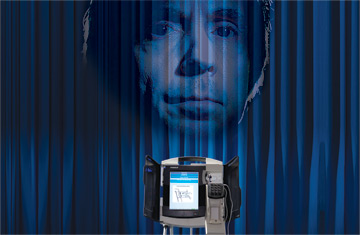
Despite a spotty past, Internet activist Brett Kimberlin has played a central role in the debate over electronic voting.
One of the first decisions Nancy Pelosi had to make after she was sworn in as Speaker of the House was one of the most basic in a democracy: whether to seat the state-certified winner of an election. Vern Buchanan, a wealthy Republican car dealer, was declared the victor of the House election in Florida's 13th District by 369 votes in November. But 18,000 voters from a heavily Democratic county somehow didn't register a choice in that particular race, and Buchanan's opponent, Christine Jennings, claims their votes were swallowed up by paperless electronic-voting machines. Jennings has brought a suit asking for a revote, and on Dec. 20 she filed a dispute with the House.
For an army of Internet activists, the verdict is already in on "Florida 13." To them, it is the latest example of suspicious Republican victories based on electronic balloting and further evidence that U.S. democracy is threatened by the increased use of e-voting. The movement is a classic Internet phenomenon. On the one hand, it is breathless and conspiratorial, its credibility undermined by exaggerated claims and unsupported accusations. On the other hand, it is on to something. The number of uncast votes for Congress in Florida's Sarasota County is anomalous and deserves scrutiny: Could almost 1 in 5 voters really have chosen not to vote for their member of Congress? And paperless balloting in general is increasingly under fire: the government's premier science-and-technology panel last month came out against it.
In the belly of the voting-reform movement is a man who personifies this paradoxical lack of credibility in the service of a credible cause. Brett Kimberlin was convicted in 1981 of a series of bombings in Indiana. By his own account, he dealt "many, many tons" of marijuana in the 1970s. Most famously, he is the man who from his prison cell alleged that as a law student Dan Quayle bought marijuana from him. Quayle repeatedly denied the charge, and it was never substantiated. In e-mails and Web postings from Kimberlin's two organizations, Justice Through Music and Velvet Revolution, he intersperses occasionally useful pieces of information about the problems of e-voting with a hefty portion of bunk, repeatedly asserting as fact things that are not true. Kimberlin, in short, is an unlikely candidate to affect an important issue of public policy.
And yet he has. Kimberlin has found a home in the blogosphere, digging up and disseminating an indiscriminate gush of anti-e-voting material. In turn, a loose network of lawyers, congressional staff members and academics have filtered that torrent, verifying and using parts of it for their cause, many of them without knowing Kimberlin's background. Most notably, he played a key, behind-the-scenes role in a Princeton study issued last September that Norm Ornstein of the American Enterprise Institute says "caused a significant alteration in the debate" over e-voting. The office of Rush Holt, the leading congressional advocate of reform, has called Kimberlin "influential" in the movement.
